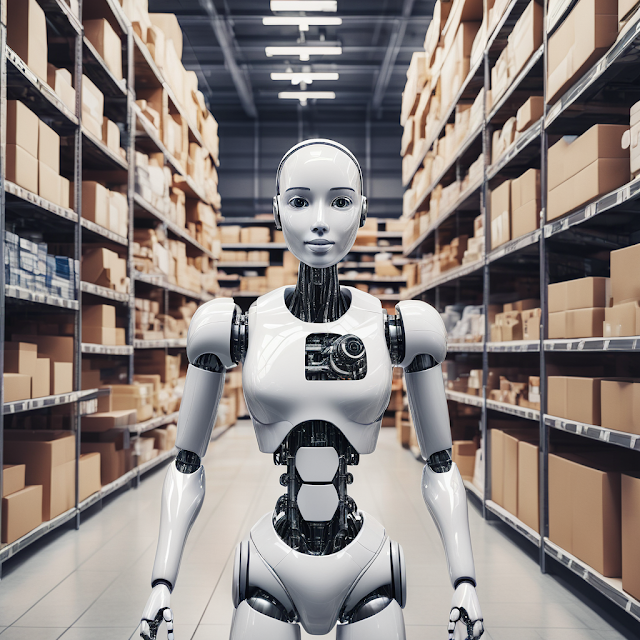Unlock the power of
AI to automate tasks, improve decision-making, and enhance employee training.
Discover how AI is reshaping workplaces for greater efficiency and growth.
Artificial intelligence (AI) stands at the forefront of
transformative technological advancements, revolutionizing the way we work
across various industries. Its rapid evolution continues to reshape workplaces,
offering unprecedented opportunities for efficiency, innovation, and growth. In
this blog post, we delve into the specific applications of AI within
workplaces, exploring its capacity to automate tasks, elevate decision-making
processes, and enhance employee training programs. By understanding the nuances
of AI integration in different workplace settings, we uncover its potential to
redefine productivity paradigms and drive organizational success in an
increasingly competitive landscape.
Automating Tasks
In your workplace, the advent of artificial intelligence (AI) has
brought about transformative changes, particularly in the realm of task
automation. Imagine a scenario where mundane, repetitive tasks that once
consumed significant time and resources can now be efficiently handled by AI
systems, freeing up valuable human capital for more strategic endeavors.
AI's ability to automate tasks stems from its capacity to analyze
vast amounts of data and perform complex computations at speeds unmatched by
human capabilities. Whether it's data entry, scheduling, or inventory
management, AI-powered systems excel at streamlining processes, minimizing
errors, and maximizing efficiency.
Consider the example of a customer service department. With
AI-driven chatbots, routine inquiries can be addressed promptly and accurately,
relieving human agents of repetitive interactions and allowing them to focus on
more complex customer needs. These chatbots employ natural language processing
(NLP) algorithms to understand and respond to customer queries, creating seamless
experiences round-the-clock.
In manufacturing facilities, AI-enabled robotic arms are
revolutionizing production lines. These robots can precisely perform assembly
tasks with incredible speed and accuracy, reducing production times and
minimizing defects. Moreover, AI algorithms continuously optimize processes
based on real-time data, ensuring optimal resource utilization and cost
efficiency.
In financial institutions, AI algorithms are reshaping the
landscape of data analysis and risk management. Complex algorithms can analyze
market trends, customer behavior, and risk factors in real-time, enabling
organizations to make informed decisions swiftly. Tasks such as fraud detection
and compliance monitoring are also streamlined through AI, mitigating risks and
ensuring regulatory adherence.
Furthermore, AI-powered virtual assistants have become
indispensable tools in many workplaces. These assistants can schedule meetings,
manage emails, and even anticipate user preferences based on past interactions.
By automating administrative tasks, virtual assistants empower professionals to
focus on high-value activities that require creativity and critical thinking.
However, while the benefits of task automation are undeniable,
there are also considerations and challenges to navigate. One concern is the
potential displacement of jobs as AI assumes roles traditionally performed by
humans. Addressing this challenge requires a proactive approach, including
reskilling and upskilling initiatives to equip employees with the skills needed
to thrive in an AI-augmented workforce.
Moreover, ensuring the ethical and responsible use of AI is
paramount. Bias in AI algorithms, for example, can perpetuate existing
inequalities if left unchecked. Organizations must prioritize diversity and
inclusion in AI development and implementation to mitigate such risks.
Enhancing Decision-Making
In your workplace, the integration of artificial intelligence (AI)
holds immense potential for enhancing decision-making processes. Picture this:
AI algorithms analyzing vast volumes of data in real-time, providing actionable
insights that empower you and your team to make informed and strategic
decisions with confidence.
One significant way AI enhances decision-making is through data
analysis. Imagine you work in a retail company, and you're tasked with
optimizing inventory levels to meet customer demand while minimizing excess
stock. With AI-powered analytics, you can access comprehensive reports that
delve into sales trends, customer preferences, and external factors such as
market conditions and seasonal variations. By leveraging predictive analytics,
AI algorithms can forecast future demand with remarkable accuracy, enabling you
to adjust inventory levels proactively and avoid stockouts or overstock
situations.
Moreover, AI algorithms excel at detecting patterns and anomalies
within data, which is invaluable in industries such as finance and healthcare.
Let's say you're a financial analyst responsible for identifying potential
fraud in transactions. AI-based fraud detection systems analyze transactional
data from multiple sources, flagging suspicious activities and alerting you to
investigate further. By leveraging machine learning techniques, these systems
continuously learn from new data and adapt their detection capabilities to
evolving fraud tactics, staying one step ahead of fraudulent actors.
In healthcare settings, AI is revolutionizing diagnostic
processes. Imagine you're a medical professional tasked with diagnosing a rare
disease based on patient symptoms and medical history. AI-powered diagnostic
systems can analyze vast databases of medical records, research papers, and
diagnostic images to suggest potential diagnoses and treatment options,
augmenting your expertise and reducing diagnostic errors.
Furthermore, AI plays a crucial role in risk management and
strategic planning. Let's say you work in a logistics company responsible for
optimizing shipping routes to minimize costs and delivery times. AI algorithms
can analyze factors such as traffic patterns, weather forecasts, and fuel
prices to recommend the most efficient routes in real-time. By incorporating
these insights into your decision-making process, you can optimize resource
allocation, enhance customer satisfaction, and gain a competitive edge in the
market.
However, while AI offers tremendous benefits for decision-making,
it's essential to acknowledge and address potential challenges. One concern is
the interpretability of AI algorithms, particularly in high-stakes
decision-making scenarios such as healthcare or finance. Ensuring transparency
and accountability in AI-driven decisions is crucial to building trust and
mitigating risks.
Moreover, ethical considerations such as bias and fairness must be
carefully managed. AI algorithms are only as unbiased as the data they're
trained on, and without proper safeguards, they can perpetuate existing biases
or inadvertently discriminate against certain groups. It's imperative to
implement robust mechanisms for bias detection and mitigation, as well as to
prioritize diversity and inclusivity in data collection and algorithm
development processes.
Improving Employee Training
In your workplace, the integration of artificial intelligence (AI)
is revolutionizing employee training, offering personalized, efficient, and
effective learning experiences like never before. Imagine being able to access
tailored training modules that adapt to your learning style and pace,
empowering you to acquire new skills and knowledge rapidly.
One significant way AI improves employee training is through
personalized learning pathways. Picture yourself embarking on a training
program tailored to your role, skill level, and learning objectives. AI-powered
learning management systems analyze your performance, preferences, and feedback
to curate customized learning paths that address your unique needs and
interests. Whether you're a new hire looking to onboard smoothly or a seasoned
professional seeking to upskill, AI ensures that your training experience is
relevant, engaging, and impactful.
Moreover, AI enables adaptive learning experiences that evolve in
real-time based on your progress and performance. Imagine participating in a
virtual training session where AI algorithms continuously assess your
comprehension and mastery of the material, adjusting the difficulty level and
content delivery accordingly. By providing targeted feedback and interventions,
AI ensures that you remain challenged yet motivated throughout the learning
journey, maximizing retention and skill acquisition.
Furthermore, AI-powered training solutions offer immersive and
interactive learning experiences that enhance engagement and knowledge
retention. Imagine using virtual reality (VR) simulations to practice complex
tasks or scenarios in a safe and controlled environment. Whether you're a
healthcare professional honing surgical skills or a customer service
representative mastering communication techniques, VR-based training enables
hands-on learning experiences that are realistic, engaging, and memorable.
In addition to personalized and immersive learning, AI facilitates
continuous feedback and performance monitoring. Imagine receiving real-time
insights and recommendations from AI-driven coaching tools as you navigate
training exercises or simulations. These tools can analyze your actions,
decisions, and interactions, providing immediate feedback and guidance to help
you improve and grow. By leveraging AI for ongoing performance monitoring and
feedback, organizations can foster a culture of continuous learning and
development, empowering employees to reach their full potential.
However, while AI offers tremendous opportunities for improving
employee training, it's essential to address potential challenges and
considerations. One concern is the need to balance automation with human
interaction and expertise. While AI-driven training solutions offer scalability
and efficiency, they must complement rather than replace human trainers and
mentors who provide invaluable guidance, support, and mentorship.
Moreover, ethical considerations such as data privacy and security
must be prioritized in AI-powered training initiatives. Ensuring transparent
data practices, consent mechanisms, and robust security measures is essential
to safeguarding sensitive information and maintaining trust among employees.
Challenges and Ethical Considerations
In your workplace, the integration of artificial intelligence (AI)
presents both exciting opportunities and complex challenges that require
careful consideration and ethical scrutiny. As you navigate the adoption of AI
technologies, it's essential to be mindful of the potential risks and
implications for individuals, organizations, and society at large.
One significant challenge is the potential displacement of jobs
due to automation driven by AI. Imagine the impact on employees whose roles are
rendered obsolete or significantly altered by AI-powered systems. While
automation can enhance efficiency and productivity, it also raises concerns
about job loss, economic inequality, and workforce reskilling. As you embrace
AI in your workplace, it's crucial to prioritize strategies for retraining and
upskilling employees to adapt to evolving job roles and industry demands.
Moreover, ethical considerations such as bias and fairness must be
addressed in AI development and implementation. Imagine the consequences of
biased algorithms perpetuating discrimination or exacerbating existing
inequalities. Whether it's AI-powered hiring tools favoring certain
demographics or predictive policing algorithms reinforcing racial profiling,
unchecked bias in AI can have far-reaching social and ethical implications. As
you leverage AI technologies, it's imperative to prioritize fairness,
transparency, and accountability in algorithm design, data collection, and
decision-making processes.
Data privacy and security are also paramount concerns in the age
of AI. Imagine the risks of unauthorized access, misuse, or manipulation of
sensitive data collected and processed by AI systems. Whether it's personal
information, confidential business data, or proprietary algorithms, safeguarding
data integrity and privacy is essential to maintaining trust and compliance
with regulatory requirements. As you deploy AI solutions, it's critical to
implement robust data governance frameworks, encryption protocols, and access
controls to protect against potential breaches and vulnerabilities.
Furthermore, the black box nature of AI algorithms poses
challenges for interpretability and accountability. Imagine the difficulty of
understanding and explaining the decision-making processes of complex AI systems,
particularly in high-stakes domains such as healthcare or finance. As AI
algorithms increasingly influence critical decisions affecting individuals'
lives and livelihoods, ensuring transparency and explainability is essential
for building trust, fostering accountability, and mitigating risks of
algorithmic bias or errors.
Addressing these challenges and ethical considerations requires a
multidisciplinary approach that involves stakeholders from across the
organization and beyond. Imagine collaborating with data scientists, ethicists,
policymakers, and community representatives to develop ethical guidelines, best
practices, and regulatory frameworks for responsible AI deployment. By
fostering a culture of ethical awareness, transparency, and accountability, you
can harness the transformative potential of AI while mitigating risks and
maximizing benefits for individuals, organizations, and society as a whole.
Conclusion
As you reflect on the integration of artificial intelligence (AI)
in your workplace, it's evident that AI holds tremendous promise for enhancing
productivity, decision-making, and employee development. Embracing AI
technologies requires thoughtful consideration of challenges and ethical
considerations, including job displacement, bias mitigation, and data privacy.
By prioritizing fairness, transparency, and accountability, you can harness the
transformative potential of AI while minimizing risks and maximizing benefits.
With a principled approach to AI adoption and governance, you can navigate the
evolving landscape of work with confidence, driving innovation and creating
positive impact for individuals, organizations, and society as a whole.








.png)
.jpg)
.jpg)







